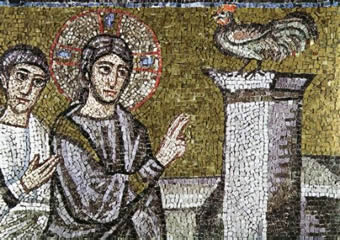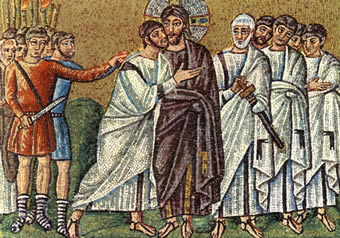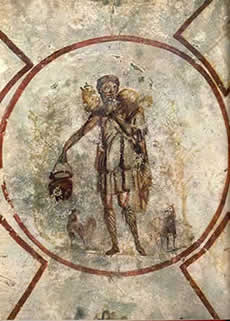"I Don't Know What I'm Doing"
Failure-Tolerant Christians
For Sunday July 3, 2011
Lectionary Readings (Revised Common Lectionary, Year A)
Genesis 24:34–67 or Zechariah 9:9–12
Psalm 45:10–17, Song of Solomon 2:8 –13, or Psalm 145:8–14
Romans 7:15–25
Matthew 11:16–19, 25–30
On a flight home from New York a few years ago, I grabbed several magazines that I don't normally read. One article caught my eye from the Harvard Business Review: “The Failure-Tolerant Leader,” by Richard Farson and Ralph Keye. The article begins with a quote from IBM's Thomas Watson, Sr.: “the fastest way to succeed is to double your failure rate.”
Farson and Keye make some interesting points. Failure is a prerequisite of invention, which requires risk taking. Failure provides insights that aren't normally gained from success. It's one thing for leaders to address failure at the abstract level of corporate policies, but quite another to acknowledge failure at the personal level. For most employees, personal failure is an enormous threat that portends embarrassment, shame, and even the loss of your job. Worst of all, the stigma of failure breeds fear.
 |
Sixth century mosaic of Peter's denial. |
Failure-tolerant leaders move beyond simplistic definitions of success and failure, where the former is always positive and the latter is always negative. There is such a thing as "successful failure." Good leaders keep things in perspective. Don Shula, one of the winningest coaches in NFL history, remarked that he “didn't get consumed by losses and didn't get overwhelmed by successes.” Failure-tolerant leaders empathize with employees by sharing their own failures and by accepting the mistakes of others. Finally, they replace a corporate culture of fierce competition with a culture of collaboration.
The article made me wonder what a "failure-tolerant Christian" might look like. After all, some of the most significant people in God's story of redemption experienced extraordinary failures. Moses was a murderer, David an adulterer, Peter denied even knowing Jesus, while Paul described himself as the “chief among sinners” for trying to destroy the church.
In this week's epistle, Paul describes a fierce struggle in his deeply divided self. He does things that he hates, and fails to do the good. He experiences covetous desires and sinful passions of every sort. Rather than doing the good he desires, he commits the evil he detests. With exasperation he describes a "war" within him that makes him a "prisoner," and confesses, “I do not understand what I do” (Romans 7:15, 23). Paul's struggle is so intense that some interpreters think that he's describing his pre-conversion life rather than a Christian experience.
About fifteen years ago I started reading the fourth century monastics who fled the corruption of church and society to seek Christ in the solitude of the Egyptian desert. Before I read the desert mothers and fathers, I thought of them as Christian super-heroes. After I read them, I realized that I couldn't have been more wrong.
 |
Sixth century mosaic, Judas betrays Jesus. |
I love these desert dwellers because they were practitioners of healing, not abstract theoreticians. They sought personal transformation, not theological information. Although the desert monastics strike us as oddballs today, we misunderstand them if we construe their asceticism as a spirituality of superficial techniques.
I love the desert monastics most of all for their profound humanity. They modeled what John Chryssavgis calls a "spirituality of imperfection" in which one is not ashamed or embarrassed to acknowledge and embrace one's brokenness, wounds, darkness, and inner demons. For them, intense struggle is a necessary component of Christian maturity.
The desert mothers and fathers tell stories that illuminate Paul's interior struggle. With remarkable candor, brutal realism, unqualified empathy, and wry humor, they describe how they experienced in the vast nothingness of the Egyptian desert a cacophony of voices in the interior geography of the heart. They sought wholeness but discovered brokenness. In the famous words of Saint Anthony the Great (251–356), the father of monasticism, they concluded that we should "expect trials until your last breath." Their reports from the front lines of spiritual battle reveal a disarming transparency about human failure and frailty.
As I review what I underlined in John Cassian's (360-435) Institutes and Conferences, here's a sampling of their self-diagnosis — lethargy, sleeplessness, dark dreams, impulsive urges, self-justification, seething emotions, sexual fantasies, pious pretense that masked as virtue, self-deception, clerical ambition and the desire to dominate, crushing despair, confusion, wild mood swings, flattery, and the dreaded "noonday demon" of acedia ("a wearied or anxious heart" that suggests close parallels to clinical depression).
It gets worse. Cassian further admits that "there are [also] many things that lie hidden in my conscience which are known and manifest to God, even though they may be unknown and obscure to me."
 |
Fresco of Jesus the Good Shepherd, c. 250. |
Cassian gives many examples. Why does a monk who joyfully renounced great wealth later succumb to intense possessiveness over a tiny pen knife, needle, or book? He observed monks giving each other the "silent treatment." What provoked a brother's anger at a dull stylus? Or why is it "that superfluous thoughts insinuate themselves into us so subtly and hiddenly when we do not even want them, and indeed do not even know of them, that it is very difficult not only to cast them out but even to understand them and to catch hold of them?" Where, in other words, was the off-switch for a psyche in overdrive?
Paul and the desert monastics encourage us to embrace our struggles and failures rather than to suppress or deny them. That can be difficult when our communities don't allow us to fail in the first place, or if they do, the price of failure is condemnation rather than consolation. Christians are famous for throwing failures under the bus. Paul, writing from his own experience, reminds us that we all carry the gospel treasure in fragile vessels, and that none of us is worthy of or adequate to the task (2 Corinthians 2:16, 4:7). James says that "we all stumble in many ways" (James 3:2).
And so Paul asks: "Who will rescue me from this body of death?" (Romans 7:24). The gospel for this week points us to Jesus: "Come to me, all you who are weary and burdened, and I will give you rest. Take my yoke upon you and learn from me, from I am gentle and humble in heart, and you will find rest for your souls. For my yoke is easy and my burden is light" (Matthew 11:25–30).
For further reflection
George Herbert (1593–1633)
Affliction (IV)
Broken in pieces all asunder,
Lord, hunt me not,
A thing forgot,
Once a poor creature, now a wonder,
A wonder tortur’d in the space
Betwixt this world and that of grace.
My thoughts are all a case of knives,
Wounding my heart
With scatter’d smart,
As wat’ring pots give flowers their lives.
Nothing their fury can control,
While they do wound and prick my soul.
All my attendants are at strife,
Quitting their place
Unto my face:
Nothing performs the task of life:
The elements are let loose to fight,
And while I live, try out their right.
Oh help, my God! let not their plot
Kill them and me,
And also thee,
Who art my life: dissolve the knot,
As the sun scatters by his light
All the rebellions of the night.
Then shall those powers, which work for grief,
Enter thy pay,
And day by day
Labour thy praise, and my relief;
With care and courage building me,
Till I reach heav’n, and much more, thee.
Image credits: (1) Geopolicraticus.wordpress.com; (2) HistoryForKids.org; and (3) ReligionFacts.com.





